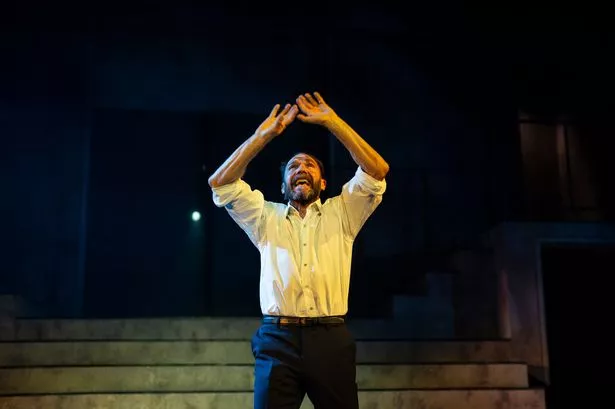There's a buzz of anticipation in the air as the audience gathers outside two large doors inside a warehouse on the outskirts of the city centre.
The crowd is a mix, fans of Shakespeare, culture vultures and a smattering of Harry Potter fans who can't pass up the chance to see Ralph Fiennes – aka Voldemort – live and in person. There's been a swathe of Macbeth productions this year as the play marks its 400th year, but this is the one I've been really looking forward to.
The doors slide open, and we are ushered through a no man's land of burning cars and rubble, the sound of helicopters overhead, the acrid tinge of smoke in the air. It's hard not to make connections with the current conflicts in Ukraine and Gaza, and the immersive scene instantly shifts Macbeth's story from the foggy mists of time and bang into the modern day.
READ MORE: I went to Garlands for the first time and their one rule stuck with me
READ MORE: Ticket prices and hospitality packages for Pink's Summer Carnival World tour at Anfield
We file into the performance space past soldiers, who welcome us, telling us we're now safe and in hushed tones we make our way to our seats. It's simple, but effective, setting the tone for what's to come.
The seating is best described as cosy, with very little space between the chairs. I don't consider myself to have particularly long legs, but my knees were almost painfully squished up against the back of the seat in front of me. Shuffling and apologies can be heard all over the round, as people squeeze past each other to reach their places.
The doors close sealing in the audience, and in the silence there's an almost synchronised pop of drinks cans being opened all around the crowd. A blinding flash of light, the deafening sound of a helicopter overhead and the show begins.
The appearance of the three witches is spine tingling, the weird sisters' animalistic screams echoing around us before they come together to utter the famous lines "double, double toil and trouble".
Ralph Fiennes arrives on set without fanfare, a solider in combat fatigues and armour, he and his close friend Banquo (played by Steffan Rhodri) are bloody and battered from fighting. They chance upon the witches, who deliver their prophecies and plant the seed of murderous ambition in Macbeth's mind.
Battle won, and he sends word to Lady Macbeth (Indira Varma) of the encounter, and what the witches said. He also warns that King Duncan and his family are travelling with him to their home where they will stay the night.
Indira Varma radiates elegance and beauty. Almost gliding down the set's stark stairs in a simple pant suit, she has hatched a plan to despatch Duncan before Macbeth is even home. When her husband begins to lose his nerve, she steelily sets him back on the path – I fear, faced with her wrath, I'd have done the same.
Macbeth is probably one of William Shakespeare's darkest and most bloody plays, and it's the gorier side of things this production gleefully leans into. The audience is shielded from the murder of Duncan, but its bloody aftermath is revealed as Macbeth steps from the dead king's doorway, shirt splattered with gore, hands dripping with blood.
I don't think it's a spoiler when I say that Duncan's death is not the only one that plays out on the stage, and each is more distressing and visceral then the next. From the frenzied assassination of Banquo, to the slaughter of Macduff's wife and children, blood is liberally and violently spilled – so much so, the stagehands sometimes have to wipe the floor as they pass through.
The production whips past at a fair old pace, the script having been abridged to remove anything – and anyone – that doesn't move the plot along. But it doesn't feel rushed.
Macbeth's descent into madness is slow and steady, providing the audience with a few laughs amid the horror. Ralph expertly moves the character along, evolving him from an almost humble soldier to an arrogant schemer, driven mad with the acquisition of power. He is compelling to watch.
Indira and Ralph have a real chemistry, although of the two, it was Indira who seemed to hold the stage better. Her portrayal of Lady Macbeth is refined, cold, and charismatic- she is hypnotic, and it's almost a shame when she dies.
For me, the most surprising moment came when Ross (Ben Allen) delivers news to MacDuff (Ben Turner) that his family have been killed. The raw emotion of Macduff's grief is palpable, and I found myself genuinely moved to tears. That fact that Ben can do that night after night is a testament to how good an actor he is.
Macbeth's ending is brutal and bloody, full of high drama and action. I don't want to go into too much detail and ruin it for those who plan to go and watch it, but needless to say, it doesn't disappoint – and the rapturous applause from the audience at the show's finale was testament to that.
Liverpool has always punched above its weight culturally, the very fact the city can secure a production of this quality says a lot.
Macbeth runs at The Depot, Digital Way, Fairfield, L7 9NP until December 20
Receive newsletters with the biggest and breaking TV and showbiz news by signing up here

